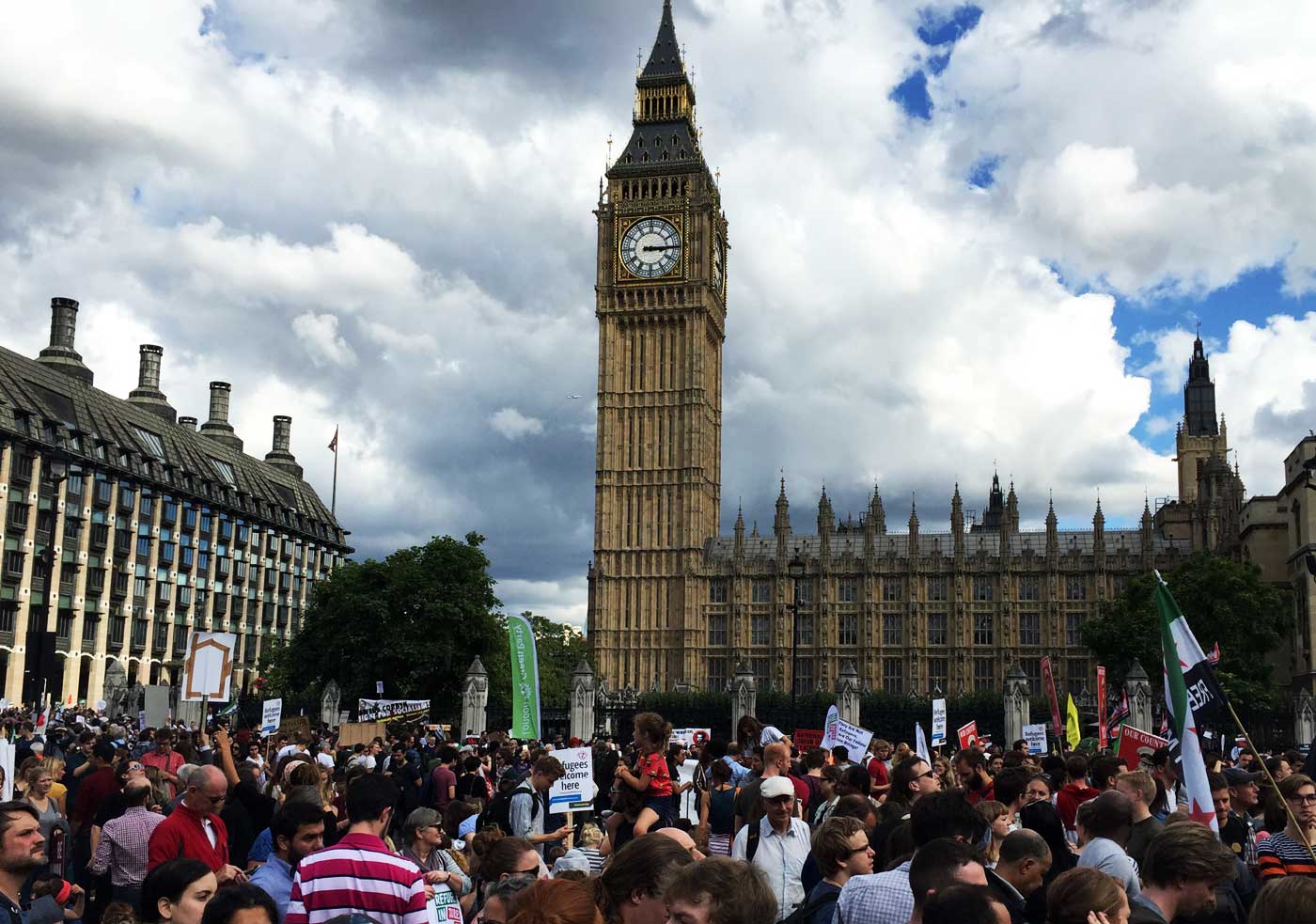 Photo credit: Sustain
Photo credit: Sustain

Seven ways we must hold our Government to account for their promises on food, farming and fishing
With a new Government in place, Sustain’s team revisits the Conservative Party manifesto to highlight how we must hold our leaders to account on promises relating to food, farming, fishing and climate change.
The new Parliamentary session began on Monday 16 December 2019. In all, 140 new MPs took their place on the green benches, 109 of them Conservative. The Conservatives now have a majority of 80 votes.
Worryingly, one of the first comments made by the Prime Minister’s spokesperson on the first day was to suggest the PM would row back on commitments made to parliament on maintaining workers' rights and environmental standards, and on giving them a say on whether the UK’s transition period out of the EU could be extended beyond the PM’s December 2020 deadline. We could still face the highly damaging prospect of a no-deal Brexit next Christmas, if the Government does not achieve a free trade agreement with the European Union in the record-breaking period of one year.
After a comparison of all key election manifestos, Sustain’s team has revisited the Conservative Party manifesto and will be scrutinising the Queen’s Speech (20th December 2019), which will set out the legislative programme for the next parliamentary session. We will be looking closely at the text of the agriculture, fishing, environment, and trade bills for references to their pledges.
The Conservative Party manifesto said British farmers and fishers “should be able to profit by producing food and fish that are the envy of the world – both for their quality and the high standards to which they were produced.” They went on to imagine people at home and abroad “lining up” to buy British and said they will not “compromise” the UK's “environmental protection, animal welfare and food standards in trade negotiations”. They said they want the UK to “lead the world in the quality of our food, agriculture and land management” and that farmers and fishers should be “stewards of the natural world, preserving the UK’s countryside and oceans as they have for generations”.
1. Climate, nature and the environment
The Conservative Party manifesto says the new Environment Bill will “guarantee” to protect and restore our natural environment after the UK leaves the EU. They renew their pledge to set up a new independent Office for Environmental Protection and introduce legal targets, including for air quality. They pledge £640 million for a new Nature for Climate fund to help reach net zero greenhouse gas emissions by 2050, as advised by the independent UK Committee on Climate Change. The manifesto says they have “doubled” international climate finance and would use the UK’s position hosting the UN Climate Change Summit in Glasgow in 2020 (COP26) to ask global partners to match their ambition.
The manifesto contains a pledge to set up new “international partnerships” to tackle deforestation and protect vital landscapes and wildlife corridors. They also say they will establish a new £500 million Blue Planet Fund to help protect oceans from plastics pollution, warming sea temperatures and overfishing, and extend the Blue Belt programme to preserve the marine environment.
They went on to pledge to lead diplomatic efforts to protect 30 per cent of the world’s oceans by 2030. They also said that the Government’s first Budget would “prioritise the environment”: investing in R&D and decarbonisation schemes and clean energy (amongst other things), including a promise to work with “the market” to deliver two million new high quality jobs in clean growth (though no indication if this includes sustainable food and farming).
They pledge an additional 75,000 acres of trees a year by the end of the next Parliament (2024), as well as “restoring” peatland and creating new National Parks and Areas of Outstanding Natural Beauty. They pledge “boosted” domestic recycling, a new levy to increase the proportion of recyclable plastics in packaging and “extended producer responsibility”, so that producers pay the full costs of dealing with the waste they produce. They also promised a “crack down on the waste and carelessness that destroys our natural environment and kills marine life” and pledged to increase penalties for fly-tipping and re-introduction of a deposit return scheme to incentivise people to recycle plastic and glass.
Sustain’s comment: Given the critical importance of climate and nature for our food system and our very survival, we concur with our friends at the Green Alliance that: “If the UK is to have credibility as a world leader on climate policy in the run up to next year’s UN climate talks in Glasgow, the new government will have to do much more, much faster.”
2. Farming
The Conservative Party manifesto reiterates their commitment for the UK to come out of the EU and pledged to replace the Common Agricultural Policy with a system based on “public money for public goods”. They guaranteed the current annual budget to farmers in every year of the next Parliament (until 2024), in return for farming “in a way that protects and enhances our natural environment, as well as safeguarding high standards of animal welfare”.
They pledged to “encourage” the public sector to “Buy British” to support our farmers and reduce environmental costs. They also said they would address farmers’ concerns by increasing the annual quota for the Seasonal Agricultural Workers Scheme from 2,500 to 10,000.
Sustain’s comment: We have long supported a ‘public money for public goods’ approach and are supporting the development of the English Environmental Land Management Scheme (ELMS) and the devolved schemes that will govern what kind of farming public money will support in the future. Farmers need secured multiannual funding to deliver the goods. We are concerned that ELMS does not yet adequately address the climate and nature emergency, nor the role of public subsidies in catalysing the shift to agro-ecological farming and sustainable land use.
3. Fishing
The Conservative Party manifesto pledges that the UK will leave the Common Fisheries Policy, maintain funding for fisheries across the UK’s nations throughout this Parliament and support the regeneration of our coastal communities. They say there will be a legal commitment to “fish sustainably” and a legal requirement for a plan to achieve maximum sustainable yield (MSY) for each stock.
Sustain’s comment: The promise of cash for coastal communities is very important but the UK fishing industry and other coastal businesses that rely on marine wildlife are imperilled unless overfishing is halted and the UK’s many depleted fish stocks are allowed to recover. This investment must therefore support a transition to lower-impact fishing gear and compensate fishers for catching less where overfishing is occurring. We welcome their promises on fishing sustainably, but to fulfil those promises government must require – in law – that catch limits must be set at levels that will allow stocks to achieve Maximum Sustainable Yield as soon as possible. This could be great news for fishers because if recovered, our fisheries could yield 45% higher landings, worth £1.4 billion every year to the UK economy.
4. Food
There are only a few references to food in the Conservative Party manifesto but they did pledge to maintain their commitment to free school meals. Prior to the General Election, our colleagues at School Food Matters wrote to the Conservative Party to check and they confirmed that this commitment covers both free school meals and universal infant free school meals.
They also promised a strategy to empower people “to live healthier lives, as well as tackling childhood obesity, heart disease and diabetes”, and commit to making progress on the Childhood Obesity Plan.
Sustain’s comment: The Government has pledged to “improve hospital food”, but without further detail, which is frustrating given the nearly 20-year history of repeated government initiatives failing to achieve this worthwhile aim (the most recent initiatives detailed here). However, we were very pleased to see renewed commitment to the National Food Strategy and Sustain looks forward to continuing our work to influence how the strategy can support efforts to make our food system fair, healthy and sustainable.
5. Animal welfare
The Conservative Party manifesto promises new laws on animal sentience, tougher sentences for animal cruelty and an end to “excessively long journeys for slaughter and fattening”. They also pledge a “crack down” on the illegal smuggling of dogs and puppies, a ban on ivory and on imports from trophy hunting of endangered animals. They will ban the keeping of primates as pets and bring forward cat microchipping. There is much less detail about the welfare of millions of farm animals that provide our food.
Sustain’s comment: The manifesto stands by earlier commitments to protect animals both at home and abroad – so we look forward to hearing how they will fulfil these promises as well as reliably avoid propping up poor animal welfare in trade deals with other countries.
6. Trade
The Conservative Party manifesto makes the following encouraging promise about future trade deals: “In all of our trade negotiations, we will not compromise on our high environmental protection, animal welfare and food standards.”
They pledge to seek “to provide security in a world of heightened trade tensions and tariffs”, seek to gain market access for British businesses and lower the cost of trade for them. They said they would drive “a hard bargain” and be prepared to “walk away if that is in the national interest”. They also pledged to defend British industries from dumping and other anti-competitive practices from overseas.
Sustain comment: We very much look forward to hearing more about the technical detail of how the Government will guarantee protection of food, animal welfare and environmental standards in trade deals. Given what we now know about the US approach to trade deals, measures to secure British standards will need to be legally robust. So we were disappointed that there were no commitments on transparency, involving parliament, scientific advisors or civil society in setting trade objectives or using trade as a lever to help deliver on critically important policies like curbing climate change and banning profligate use of antibiotics in farming.
And what wasn’t in there?
7. Household food insecurity
Sustain’s comment: Notable by its absence, household food insecurity and food poverty do not get any mention in the Conservative Party manifesto. This is regrettable, given the strong cross-party support prior to the General Election for decisive action to reverse the unacceptable rise in food poverty, of which the dramatic rise in need for emergency food banks is only the most visible part. There had also been a welcome rise in cross-party political interest in the Right to Food – a legal approach that could help end hunger in the UK. Sustain is keen to see the National Food Strategy champion this game-changing approach under the new government.
Sustain: Sustain The alliance for better food and farming advocates food and agriculture policies and practices that enhance the health and welfare of people and animals, improve the working and living environment, enrich society and culture and promote equity.
Sustain
The Green House
244-254 Cambridge Heath Road
London E2 9DA
020 3559 6777
sustain@sustainweb.org
Sustain advocates food and agriculture policies and practices that enhance the health and welfare of people and animals, improve the working and living environment, promote equity and enrich society and culture.
© Sustain 2026
Registered charity (no. 1018643)
Data privacy & cookies
Icons by Icons8







